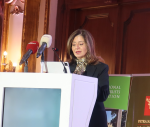You are here
Before issuing optimistic statements on Syria
Sep 06,2017 - Last updated at Sep 06,2017
UN envoy Staffan de Mistura predicted that Daesh strongholds in Syria could fall by the end of October, which, in his view, could prompt the international community to press for free and fair elections.
“What we are seeing is, in my opinion, the beginning of the end of this war... what we need to make sure is that this becomes also the beginning of peace.”
He admitted, however, that three locations remain contested: Raqqa and Deir Ezzor, where Daesh fighters are up against US-backed and Russian-sponsored Syrian forces, and Idlib province, which is controlled by Al Qaeda’s offshoot, Jabhat Fatah Al Sham.
De Mistura appears overly optimistic.
Although Daesh may lose its grip on territory, Daesh fighters will continue to threaten Syria, neighbouring Iraq, the region and Europe.
Rival external powers who have mounted proxy wars in Syria will carry on with their dirty, deadly and destructive games.
First, let us look at Raqqa, Daesh’s former “capital”.
Raqqa is besieged by US-allied Kurdish-led Syrian Democratic Forces (SDF). Once Daesh forces in the city capitulate, the SDF will have to expel surviving fighters from the rest of the province.
Some are likely to cross the border into Iraq, where there are still Daesh-held pockets of territory.
Baghdad, which has supported Damascus during the war, will not be pleased, but Daesh fugitives from Iraqi campaigns in Mosul, Tal Afar and other towns often fled to Syria.
The SDF plans to establish provincial and municipal administrations once Daesh is expelled from Raqqa city and province.
These administrations are to be linked to councils in the Kurdish region established by the SDF south of the Turkish border. The SDF’s political bosses have pledged that these bodies will remain within Syria under the Syrian government.
Syria’s Deputy Foreign Minister Faisal Mekdad dismissed Kurdish plans and said Damascus will eventually reassert control over Raqqa.
Since the government is fully supported by Russia and Iran, where does this leave the US, which has established bases in the Kurdish-held swath of territory?
Damascus, Moscow and Tehran are unlikely to agree to a permanent US military presence in northern Syria, while Ankara, fearing Kurdish irredentism at home, has deployed Turkish troops and tanks, and Syrian takfiri militias in Syria, and has sworn to use force to erase the Kurdish self-rule region along the border.
Second, the Syrian army and its Russian and Iranian allies have preempted an intended post-Raqqa US-backed SDF offensive against Deir Ezzor, the remaining major Daesh asset in Syria and refuge for Daesh commanders and fighters escaping the ongoing anti-Daesh campaigns in Syria and Iraq.
Although Syrian forces have been engaged in this campaign since May, they only made major breakthroughs in recent weeks.
The Syrian army is close to securing the Deir Ezzor garrison and adjoining quarters of the city besieged by Daesh since 2014.
There are 7,000 Syrian soldiers and 90,000 civilians in the government-held area, and 10,000 civilians trapped in districts under Daesh rule.
Once the whole of Deir Ezzor city is captured by Damascus’ forces, the government will restore its administration while the army and pro-government militias mop up Daesh throughout the province.
Large tracts of land and the principal oilfield have already been captured by the Syrian army. The return to Damascus’ control of Deir Ezzor will be a major strategic victory for Syrian President Bashar Assad who, even former US ambassador to Syria, Robert Ford — the former self-styled “ambassador to the opposition” — now admits is set to remain in power.
Third, Turkey could be a serious spoiler in any effort to make peace in Syria.
Idlib could become a battleground between Ankara, which has organised anti-Assad takfiri factions into a “Syrian National Army”, and Damascus, Moscow and Tehran, which remain determined to rout Al Qaeda’s Jabhat as well as Daesh.
Turkey seeks to convince Jabhat, which fought hard for possession of Idlib, to disband and let its fighters join other takfiri outfits taking shelter under the umbrella of the “Syrian National Army”, the rebranded shambolic “Free Syrian Army”.
Rival and competing insurgent groups which have refused to unite and submit to central command and control since Turkey established the “Free Army” in 2011, are unlikely to capitulate now.
Jabhat cannot be expected to dissolve itself shortly after achieving its objectives in Idlib.
While the US and its coalition partners have focused on Daesh, both it and Jabhat are branded “terrorist” organisations by the UN, despite the fact that the US and its European and Arab allies have directly and indirectly supported Jabhat during battles against government forces.
This has been a hypocritical and shortsighted policy.
If Al Qaeda is safely based in Idlib, it could take over from Daesh as the main takfiri menace to the region, Asia, Africa and Europe.
Al Qaeda and its offshoots have not surrendered their aims or ambitions.
De Mistura’s suggestion that if Daesh is defeated in Raqqa and Deir Ezzor by the end of October, an election can be held after a year is also unrealistically optimistic. External powers that have waged proxy wars against the government and each other can be expected to interfere.
Russia and Iran insist that Assad has to be involved in the transition, while Turkey and other countries that have sought his overthrow contend he has to stand down or be removed ahead of the transition.
While Russia and Iran argue that Assad has to stay until Syria is stabilised, the regime change camp does not seem to care what will happen if he leaves power.
There is no expatriate foreign-sponsored opposition figure that has support in Syria and can replace Assad, who commands the backing of the army, the intelligence services, the commercial class, the bureaucracy and millions of Syrians, some of whom may not like him but seek an end to war.
The opposition camp also knows that if he remains through the transition, he will win any free and fair, UN-supervised election. This is why his antagonists want him out of the way before any transition begins.
Eighty per cent of Syrians living in the country now dwell in government-controlled areas. Displaced persons have moved there from areas of conflict.
They know that if Assad goes, the powers that have been fighting proxy wars in the country will begin new conflicts over who should be his successor.
De Mistura should make a serious study of the situation before he issues optimistic statements.












